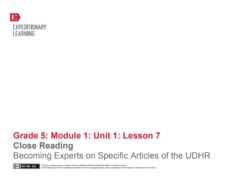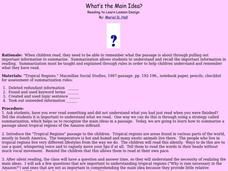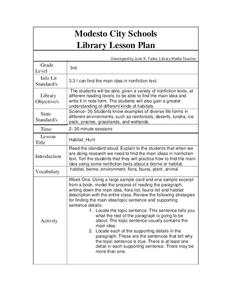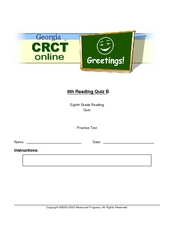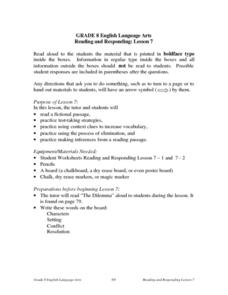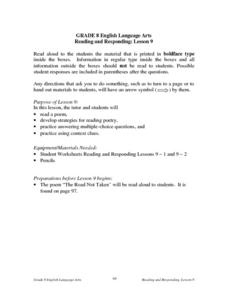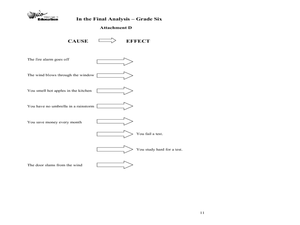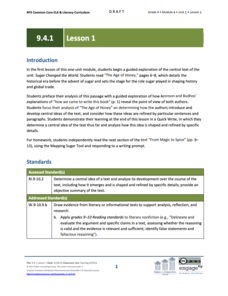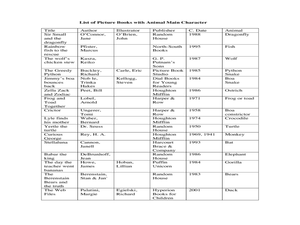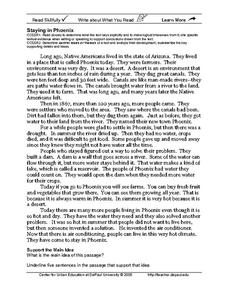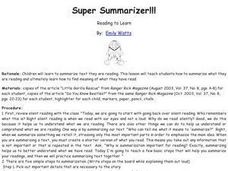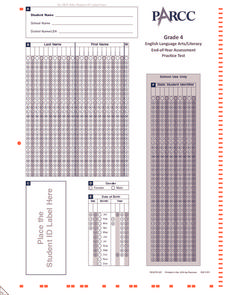EngageNY
Main Ideas in Informational Text: Analyzing a Firsthand Human Rights Account for Connections to Specific Articles of the UDHR
Lesson 10 in a series of human rights lessons focuses on the skills of finding evidence and summarizing. Your young readers work to compare the two texts they have read in this unit: the Universal Declaration of Human Rights...
EngageNY
Close Reading: Unpacking Specific Articles of the UDHR
Lesson 6 of this extensive unit finally has your class begin to work their way through specific articles from the text of the Universal Declaration of Human Rights (UDHR). Before examining the rights actually detailed in the document,...
EngageNY
Close Reading: Becoming Experts on Specific Articles of the UDHR
A continuation of the previous lesson, which is part of a larger group of lessons on human rights (see additional materials). Here, in Lesson 7, your class will explore more articles from the Universal Declaration of Human Rights. After...
Fluence Learning
Writing About Informational Text: Music and the Brain
Even if you've never picked up a musical instrument, chances are that music has directly impacted your mental and emotional development. Sixth graders engage in a reading activity in which they read two articles on the impact of music on...
Curated OER
What's the Main Idea?
Students summarize a piece of text. After reviewing the correct way to read and summarize, students work in groups to summarize a piece of text assigned by the instructor. They write a summary paragraph using the process outlined during...
Curated OER
Habitat Hunt
Third graders read several nonfiction texts and practice finding the main idea for the text as well as learn about various habitats. In this main idea instructional activity, 3rd graders read several nonfiction texts and make habitat...
Curated OER
Summarization Superstars
How do you read when you know you're going to be summarizing a text? Summarize a nonfiction text with your upper elementary schoolers. Your pupils independently read a nonfiction article and write a summary paragraph using the six-step...
Curated OER
Georgia CRCT Online: 8th Reading Quiz B
Practice for a standardized test or reinforce reading comprehension with this practice test, designed for the Georgia Criterion-Referenced Competency Test (CRCT). Twelve reading questions about two short passages (one fiction, one...
Curated OER
Reading and Responding -- Lesson 7
Fourth graders work individually or in a small group to (1) read a nonfictional selection, (2) identify main idea and details, (3) identify the author's purpose, and (4) practice test-taking strategies.
Baruch College Writing Center
Summarizing, Paraphrasing, and Quoting Workshop
What's the difference between summarizing and paraphrasing? Show class members how to find the main ideas from informational text and condense it, restate it, or quote it directly with a series of educational activities based on two...
Curated OER
Reading and Responding -- Lesson 9
Fourth graders work independently or in a small group with a tutor or teacher to (1) read a nonfictional selection, (2) practice drawing conclusions, (3) identify main ideas, and (4) practice responding to cause and effect questions.
Curated OER
The Final Analysis: Cause and Effect, Fact and Opinion
Middle schoolers read and review informational texts, analyze cause and effect, and distinguish fact from opinion. They assess a "one-minute mystery" you read aloud for cause and effect relationships. Resource includes complete set of...
Curated OER
Rachel's Life is in a Hole
Explore how lack of access to water impacts peoples' lives in poor countries. Through text reading and discussion, middle schoolers are presented with the story of a young girl who lives and functions with limited water resources. They...
EngageNY
Grade 9 ELA Module 4, Unit 1, Lesson 1
How do writers introduce and develop the central ideas in a text? To answer this question, ninth graders closely examine "The Age of Honey," the opening chapter in Marc Aronson and Marina Budhos' Sugar Changed the World: A Story of...
Mark Twain Media
Understanding Informational Text Features
Everything you need to know about informational text features can be found in this resource. Recognizing these types of text features and how they are used in text allows readers to better understand information. Teachers can use this as...
Curated OER
Find an Animal! Find a Book!
Young scholars identify the themes of different books by classifying their genre. In this genre lesson, students examine a specific animal by reading both a nonfiction and fiction book about the species. Young scholars compare the...
Curated OER
Staying in Phoenix
Read to learn! Here is a one-page informational passage about inhabitants of Phoenix, Arizona. Learners will read to make logical inferences and determine the central idea or theme. Prompts ask the class to identify the main idea and...
Pennsylvania Department of Education
Comparing Key Ideas and Details in Fiction and Nonfiction
Students recognize the differences between fiction and nonfiction texts. In this genre study instructional activity, students discuss what nonfiction means and write the definition. Students listen to a read aloud and vote whether the...
Pennsylvania Department of Education
Analyzing Key Ideas and Details in Nonfiction
Students explore nonfiction texts. In this language arts instructional activity, students read a nonfiction text and make predictions. Students identify facts and opinions in the text and draw conclusions as they read.
Curated OER
Super Summarizer!!!
Emerging readers summarize a nonfiction text using a five step process. After a brief demonstration of the five-step method for summarizing text, they read a nonfiction article and write their own summary. A checklist of each summary is...
Curated OER
End-of-Year Practice Test (Grade 4 ELA/Literacy)
The time has come to find out what your fourth grade readers have learned after another year of hard work. This Common Core-designed practice assessment provides two reading passages, one narrative and one expository, that children must...
Curated OER
End-of-Year Practice Test (Grade 5 ELA/Literacy)
The end of the year has arrived, which means it's time to find out exactly what your fifth graders have learned over the past few months. With the help of this Common Core-designed assessment that includes two narrative passages and 12...
Curated OER
Nonfiction Genre Mini-Unit: Persuasive Writing
Should primary graders have their own computers? Should animals be kept in captivity? Young writers learn how to develop and support a claim in this short unit on persuasive writing.
Curated OER
Practice Book O
Whether you need resources for reading comprehension, literary analysis, phonics, vocabulary, or text features, an extensive packet of worksheets is sure to fit your needs. Based on a fifth-grade curriculum but applicable to any level of...




